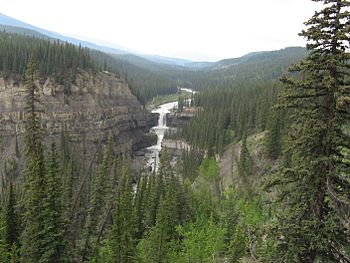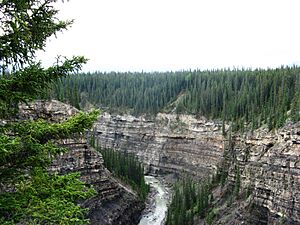Bighorn River (Alberta) facts for kids
Quick facts for kids Bighorn River |
|
|---|---|

Bighorn River Valley and Crescent Falls
|
|
| Country | Canada |
| Province | Alberta |
| Physical characteristics | |
| Main source | Bighorn Meadows 1,985 m (6,512 ft) 52°17′34″N 116°32′39″W / 52.29278°N 116.54417°W |
| River mouth | North Saskatchewan River 1,216 m (3,990 ft) 52°21′17″N 116°14′51″W / 52.35472°N 116.24750°W |
The Bighorn River is a short but interesting river located in the Alberta foothills of Canada. It flows into the North Saskatchewan River, which is a much larger river. The Bighorn River, along with the nearby Bighorn Mountains and the Bighorn Dam, are all named after the amazing Bighorn sheep that live in this area. The name "Bighorn" was first used for this river way back in 1865.
Contents
What is the Bighorn River?
The Bighorn River is not very long, but it plays an important role in the local environment. It starts high up in the mountains and flows through different types of land. This river is a "tributary," which means it's a smaller river or stream that flows into a larger one. In this case, it feeds into the North Saskatchewan River.
Where Does the Bighorn River Start?
The Bighorn River begins its journey in a place called Bighorn Meadows. This area is located in the beautiful foothills of Alberta, Canada. The river starts at a high elevation, about 1,985 meters (or 6,512 feet) above sea level. From there, it begins its exciting flow downhill.
The River's Journey: Falls and Canyons
As the Bighorn River flows, it passes under Mount McGuire. Soon after, it is joined by two smaller streams: Littlehorn Creek and Sunkay Creek. These creeks add more water to the river. One of the most exciting parts of the river's journey is when it plunges over the impressive Crescent Falls. These waterfalls are a popular sight in the area.
After the falls, the Bighorn River travels through a deep and significant canyon. This canyon was carved out by the river over many, many years. The river then flows through the Bighorn Indian Reserve. Finally, the Bighorn River empties into the North Saskatchewan River after passing by Lake Abraham. Lake Abraham is a large, artificial lake known for its unique frozen bubbles in winter.
Why is it Called Bighorn River?
The name "Bighorn River" comes from the Bighorn sheep. These wild sheep are famous for their large, curved horns, especially the males. They are native to North America and are often found in mountainous regions. The area around the river, including the nearby mountains, is a natural habitat for these magnificent animals. Naming the river after them helps to remember the wildlife that makes this region special.
 | Madam C. J. Walker |
 | Janet Emerson Bashen |
 | Annie Turnbo Malone |
 | Maggie L. Walker |


